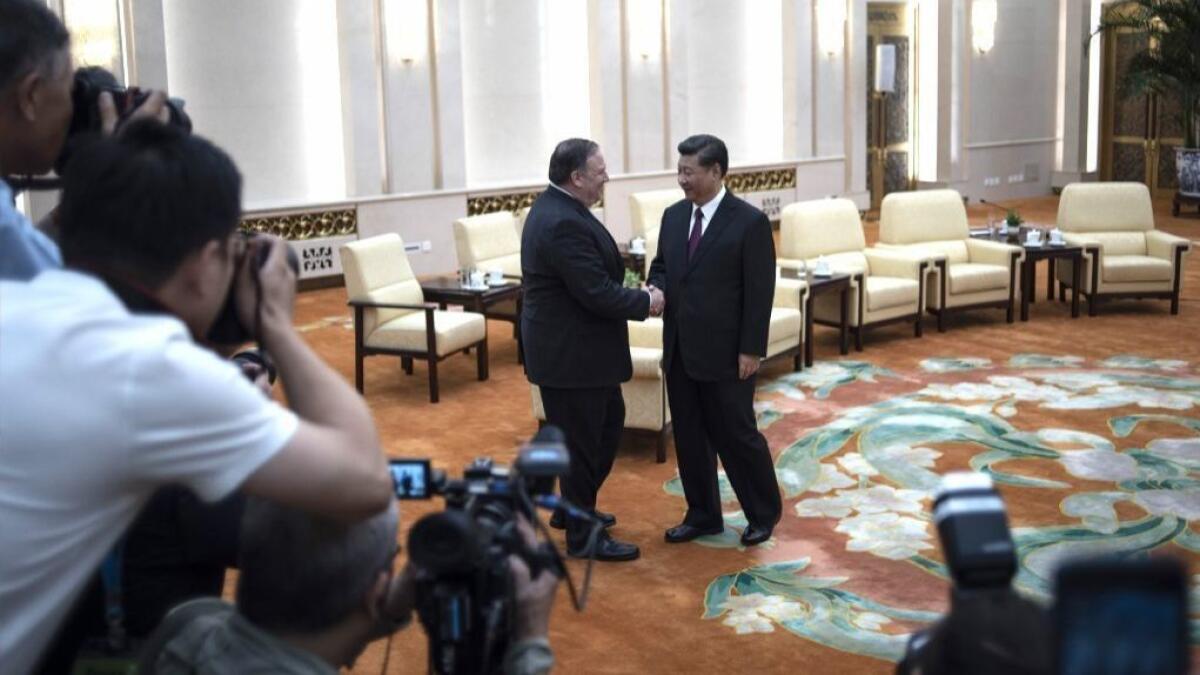U.S. seeks to assuage Asian allies and secure China’s support after North Korea summit

- Share via
Reporting from Washington — President Trump’s top diplomat told China on Thursday that the United States still needs its help in restoring North Korea “to the community of nations,” and insisted that the long-isolated, nuclear-armed country had gotten no significant concessions in this week’s summit.
It was Secretary of State Mike Pompeo’s second day of whirlwind diplomacy following the summit that Trump and North Korean leader Kim Jong Un held Tuesday in Singapore, where they agreed in vague terms to work “toward” nuclear disarmament.
Trump roiled allies in Asia as well as former and current officials in Washington by his post-summit claim that the nuclear threat from Pyongyang was “over,” and by his surprise announcement that he was ending joint U.S.-South Korea military exercises. Also raising questions was North Korea’s reporting that Trump had agreed to a phased denuclearization plan and to easing economic sanctions against the country.
Pompeo’s arrived in Beijing after a day of meetings with South Korean and Japanese officials in Seoul on Wednesday aimed at reassuring those governments and clarifying the apparent contradictions.
The secretary of State held talks Thursday night with Chinese President Xi Jinping, who, despite tensions over trade and China’s military expansion in the South China seas, said he and Trump enjoyed a “solid working relationship.”
As reporters looked on in Beijing’s Great Hall of the People, Pompeo told Xi that the Trump administration “wanted to share with you our hopes” about what might be achieved with North Korea “in the coming days and months.”
Earlier, Pompeo and Chinese Politburo member Yang Jiechi discussed steps that might ultimately lead to the “reintroduction of North Korea in the community of nations.”
As North Korea’s closest ally and major trading partner, China exercises considerable influence over Kim. China agreed to additional international sanctions against Pyongyang last year, as Trump urged, but it has been eager to lift them. Some reports say China already has begun doing so, and Trump has disapprovingly suggested as much, too.
Pompeo dismissed those reports, saying China had reassured him that it continued to support the sanctions. He also challenged a report from an official North Korea news agency that Trump had agreed to a “step by step” process that would include lifting the sanctions.
China, South Korea and Japan “acknowledged that it is important that the sanctions regime that is in place today remain in place until such time as that denuclearization is in fact complete,” Pompeo said.
“There has been unanimity in that set of objectives,” he added. The three countries, together with the United States, “have made very clear that the sanctions and the economic relief that North Korea will receive will only happen after the full denuclearization, the complete denuclearization, of North Korea.”
Pompeo acknowledged areas of disagreement that China and the United States will continue to debate, including Beijing’s trade practices and its attempts to “militarize” parts of the South China Sea.
Also on Thursday, the state-controlled North Korean television belatedly broadcast footage of the summit two days earlier. One of the images shows Trump saluting a North Korean general, with Kim in the background looking somewhat taken aback.
The president’s deference toward the leader of a repressive military incited criticism in Washington and on social media, including from some conservatives. White House Press Secretary Sarah Huckabee Sanders defended the president’s gesture, contending it was a customary practice to salute a foreign military officer after he or she does the same.
The Singapore summit marked the first time a sitting U.S. president met face-to-face with a North Korean leader. Recent American presidents have refused to do so at least until North Korea complied with past promises to end its nuclear program, arguing that such a meeting would reward what had been seen as an abusive rogue regime. North Korea reneged on previous commitments.
As Pompeo prepared to return home, still unresolved was the contentious issue for Asian allies of Trump’s decision to end the U.S. military drills held annually with South Korea as a part of its defense since the end of the Korean War more than 60 years ago.
Trump, granting a long-standing wish of North Korea and China, said ending what he called provocative “war games” — echoing the language of Pyongyang and Beijing — would “save a lot of money.”
South Korean Foreign Minister Kang Kyung-wha, after his meeting on Wednesday with Pompeo, told reporters that the military-exercise issue “was not discussed in depth.”
Pompeo has said the exercises could be resumed if North Korea is found to be negotiating in bad faith.
UPDATES:
2:50 p.m.: This article has been updated throughout with staff reporting.
This article was originally published at 8:55 a.m.
More to Read
Get the L.A. Times Politics newsletter
Deeply reported insights into legislation, politics and policy from Sacramento, Washington and beyond. In your inbox twice per week.
You may occasionally receive promotional content from the Los Angeles Times.











